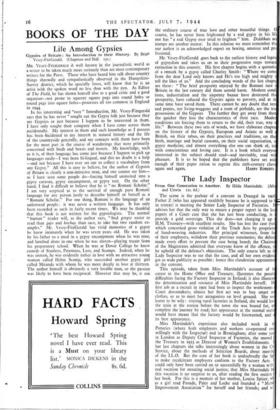BOOKS OF THE DAY
Life Among Gypsies
MR. VESEY-FITZGERALD it well known in the journalistic world as a writer to be taken much more seriously than are most contemporary writers for the Press. Those who have heard him talk about country things shrewdly and sympathetically observed in the Hampshire- Surrey district, which he specially loves, will know that he is an artist with thr spoken word no less than with the pen. As Editor of The Field, he has shown himself also as a good critic and a good organiser—not prone to squeeze square pegs into round holes or round pegs into square holes—processes all too common in England in 1944.
In his interesting and "easy " Introduction, Mr. Vesey-Fitzgerald says that he has never " sought out the Gypsy folk just because they are Gypsies or just because I happen to be interested in them. I have only sought their company when I have come across them accidentally. My interest in them and such knowledge as I possess has been incidental to my interest in natural history and the life of the countryside generally, and my contacts with them have been for the most part in the course of wanderings that were primarily concerned with birds and beasts and insects. My knowledge, such as it is, of their language has come just because I happen to pick up languages easily—I was born lii-lingual, and this no doubt is a help —and not because I have ever set out to collect a vocabulary from any Gypsy." All this is easy to believe, for the author of Gypsies of Britain is clearly a non-intrusive man, and one cannot see him— as I have seen some people do—forcing himself uninvited into a gypsy caravan, gypsy encampment, or gypsy tent. On the other hand, I find it difficult to believe that he is "no Romani Scholar." I am very sceptical as to the survival of enough pure Romani language for any person justly to describe himself or herself as a " Romani Scholar." For one thing, Romani is the language of an unlettered people: it was never a written language. It has only been recorded as such in fairly recent times. We may be thankful that this book is not written for the gypsiologists. The normal " human " reader will, as the author says, " find gorgio easier to read than gait) and hachay than zace, to take but two random ex- amples." Mr. Vesey-FitzGerald has vivid memories of a gypsy he knew intimately when he was seven years old. He was taken by his father to a meal in a gypsy encampment when he was nine, and lunched alone in one when he was eleven—playing truant from his preparatory school. When he was at Dover College he knew crowds of Stanleys, Patemans, Lees, and Scamps. Indeed, when he was sixteen, he was evidently rather in love with an attractive young woman called Helen Scamp, who succeeded another gypsy girl called Miranda with whom he was more deeply in love at thirteen. The author himself is obviously a very lovable man, so the passion was likely to have been reciprocal. However that may be, it ran
the ordinary course of true love and other beautiful things. course, he has never been frightened by a real gypsy in his hf nor has " a real Gypsy ever tried to frighten " him. Diddikais an tramps are another matter. In this relation we must remember th our author is an acknowledged expert on boxing, amateur and p fessional.
Mr. Vesey-FitzGerald .goes back to the earliest history and lege of gypsydom and takes us on to their progressive steps towar extinction in this country. His first chapter begins with a quotati of a remark by a gypsy called Charley Smith: " Where we corn from the dear Lord only knows and He's too high and mighty tell the likes of us." And the concluding words of the last chapt are these: " The brief prosperity enjoyed by the Romani race Britain in the last century did them untold harm. Modern con tions, industrialism and the sixpenny bazaar have destroyed th prosperity, have reduced the Gypsies again to poverty, and at t same time have saved them. There cannot be any doubt that ten and ponies, not living-waggons and a team of piebalds, are the tru possessions of the Gypsies. The further they get away from the the quicker they lose the characteristics of their race. Mode conditions are forcing them to return to the old, their true, way life." Between these two sets of words, we have elaborate chapt on the history of the Gypsies, European and Asiatic as well British, on their tabus, on their practices and traditions, on the birth, marriage and burial customs, on their social organisation, gypsy medicine, and almost everything else one can think of, to with conscientious and loving care. It is a book which everyo interested in the subject should read—and inevitably, read wi pleasure. It is to be hoped that the publishers have set asid enough of their paper ration to reprint this loth-century class


























 Previous page
Previous page